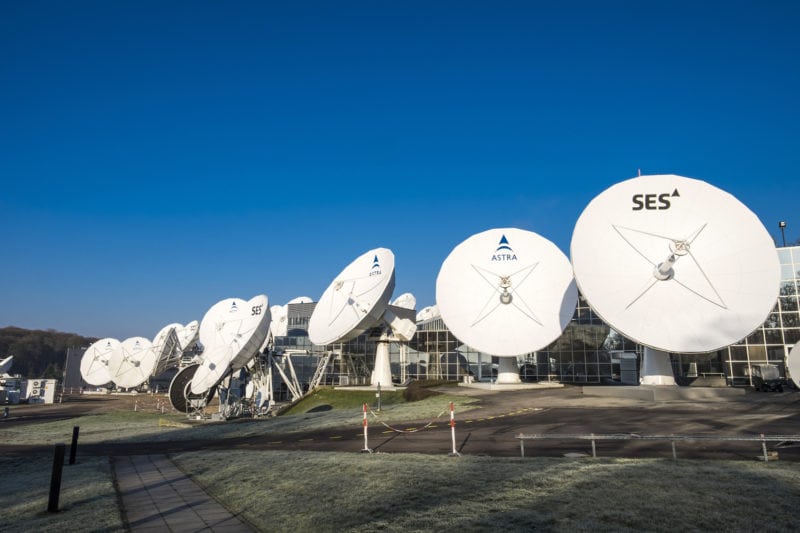Analysts Say SES Faces Mobility Headwinds, But Growth is on the Horizon

SES antennas at the satellite operator’s headquarters in Luxembourg. Photo Credit: SES
Two major investment bank analysts’ put out reports Monday looking at the future prospects for SES, with some interesting comparisons to its European rival, Eutelsat. Berenberg has placed a ‘hold’ rating on SES stock right now, while Deutsche Bank has a ‘buy’ rating. Both analyst reports noted SES is facing headwinds in mobility because of the COVID-19 pandemic, but noted that growth is in the future.
Sarah Simon, a satellite equity analyst at Berenberg examined the possibility of a combination of the two companies going forward. Simon wrote in the research note: “There has long been speculation that the two companies could seek to combine and there would certainly be synergies. However, even if the European Commission seems keen to support the creation of European champions to fight the ‘FANG’ [Facebook, Amazon, Netflix, Google] oligopoly, we are not convinced that there is yet sufficient infrastructure competition in ‘unconnected’ areas to permit a combination of the two companies. We do see consolidation outside Europe as likely, however, given the many small country-sponsored players that lack sufficient scale.”
Simon raised a number of questions and potential obstacles that would surround a Eutelsat/SES combination, even if the European Commission is open to such an idea. “Would the French government be prepared for Luxembourg to take charge (as is implied by the relative market capitalizations)? Would the Luxembourg government be prepared to have its stake so diluted? Would SES, which has pursued a B2B data-led growth strategy, want to take on a business that is still over 60% video-dependent, and which has pursued a more B2C broadband route? Would Eutelsat want exposure to the still substantial U.S. video business, which faces ongoing pressures? Clearly there are many questions to be answered here,” she wrote.
Simon addressed a number of different markets, in particular the mobility market and how this could impact SES going forward. Berenberg’s transport analysts believe that that air and cruise traffic will remain materially depressed for some time, which makes it highly unlikely that the operators of such business will be willing to sign contracts for additional capacity in the short to medium-term.
“Indeed, SES management has acknowledged the difficulty of signing new business in the current environment. That leaves growth reliant on pre-existing contracts, but if we look at SEC filings for Gogo and Global Eagle (the latter is now in Chapter 11), their disclosed minimum commitments for the purchase of satellite transponder capacity (the figure also includes teleport services for Global Eagle) suggest that SES’s revenues from these two customers could actually decline in 2021. For, with such low air traffic, it is unlikely that either company will breach their minimum bandwidth requirements,” Simon wrote.
Berenberg has adjusted its 2020 mobility estimates to assume that they remain flat sequentially for the next two quarters. It has also assumed a slight worsening of the receivables position at year-end to reflect delayed payment terms with existing suppliers in this area. Simon also believes that Intelsat’s acquisition of Gogo will likely lead to a negative impact for SES. “Part of the rationale for the deal is the combination of Intelsat’s space segment with Gogo’s technology and customer relationships, which suggests that Gogo will look internally for capacity first, whereas previously it would have talked with all suppliers of suitable bandwidth. In such a scenario, Gogo will inevitably become a less good customer for SES bandwidth,” she wrote.
Berenberg has a ‘hold’ rating on SES right now. Simon said SES is cheap right now, and trades broadly in line with peer Eutelsat on an underlying basis, but she prefers Eutelsat’s cash flow profile. “Although SES can fund its investment plans with future C-band monies, its cash flow profile presents higher risk. Its fast-growing mobility business now faces significant growth headwinds as a result of COVID-19, and it looks likely to continue to underperform its French counterpart in video. Until evidence emerges that SES can grow notably faster than Eutelsat, we think it should trade at a discount to Eutelsat,” she wrote.
However, Simon thinks that the company should return to growth from 2020, driven by new satellite launches and mix shift (less Video, more Networks). She does believe that margins are likely to continue to decline given the lower margins attributable to Networks, compared with Video.
Deutsche Bank
Roshan Ranjit, a satellite equity analyst at Deutsche Bank also put out a research note on SES on Monday and was pretty positive, although he admits that the SES share price performance has been quite volatile over the last two months. However, he thinks the recent news has been relatively positive both on fundamentals and on C-band developments.
“The overall sentiment around video renewals has been positive with SES only expecting modest renewals in Europe in H2, and international renewals are relatively advanced so there are limited surprises. Whilst addressing the headwinds around mobility (driver of our EBITDA downgrade) we felt commentary from our (recent) conference was positive. We reiterate our ‘buy’ rating with revised 10 euros price target,” Ranjit said.
Ranjit admits mobility is the big headwind for now for SES now, but that future growth and smoothing of the current revenue profile helps mitigate the bumps ahead as was evident in SES’s recent Second Quarter (Q2) results. “We would have liked more insights on the how the ‘Strategic Transformation’ (at a recent DB conference) was going given the levels of interest and discussions we have with investors around the topic, but we acknowledge internal discussions are ongoing and we eagerly await an update. C-band developments are going according to the outlined time frame, recent news flow around cable lawsuits is not helpful but the company is not overly concerned.”